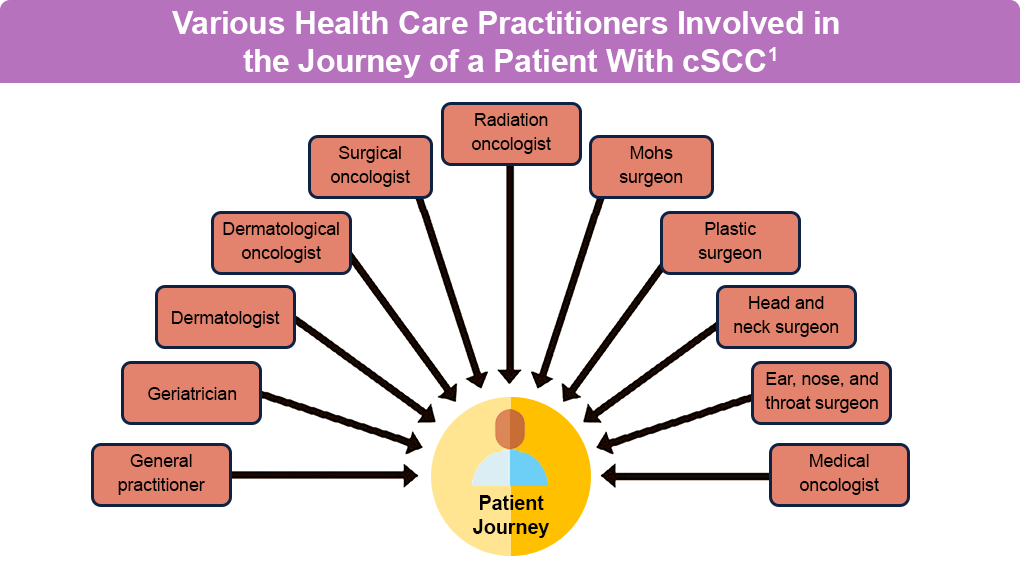The cSCC Team
Effectively managing cutaneous squamous cell carcinoma (cSCC) involves collaborating with various specialists and patients. This multidisciplinary team approach ensures you get comprehensive care tailored to your needs. Here’s what you need to know about the healthcare professionals who may be involved in your treatment and how they work together to provide the best care.
Key Elements of a Multidisciplinary Approach
Prompt and appropriate referrals are crucial for rare or high-risk cSCC cases. Networks that facilitate these referrals can significantly improve patient outcomes. Experts from the Association of Community Cancer Centers’ program, Advanced Non-Melanoma Skin Cancers: Effective Practices in Multidisciplinary Care, have outlined strategies for effectively managing non-melanoma skin cancer, emphasizing cross-specialty collaboration.2
- Communication
- Among Specialists: Close relationships within the team ensure everyone is informed about your treatment and high-risk features.
- With You: Clear communication between you and your healthcare providers is crucial.
- Identifying Risks
- High-Risk Cases: Early identification of high-risk cSCC and patients at risk of recurrence helps in planning the right treatment.
- Addressing Psychosocial Impact
- Support: The team helps manage the emotional, physical, and financial challenges of a cancer diagnosis.
- Therapeutic Consideration
- Treatment Options: Evaluating various treatments like surgery, radiation, immunotherapy, and clinical trials to find the best approach for you.
Making the Referral Process Easier

Find Local Experts
Identify specialists in your area who can help.

Effective Communication
Ensure all team members stay in touch and share information.

Streamlined Referrals
Develop a clear process for referring you to the right specialists.

Address Obstacles
Identify and tackle any barriers to getting the care you need.

Inform General Practitioners
Keep your primary care doctor updated about your condition and the specialist care you need.
What This Means for You
By working together, your healthcare team ensures you receive timely, comprehensive care. This collaborative approach tailors the treatment plan to your unique situation, from diagnosis to follow-up care, improving your overall outcomes and quality of life.3 Remember, ongoing communication with your primary care team and specialists is key to managing your health effectively.
Feel free to ask your care team members about their roles, their training, and the specific parts of your treatment they’ll be handling. Understanding how your team works and communicates with each other will help you and your loved ones know who to turn to for various concerns that may arise.4
References
- Claveau J, Archambault J, Ernst DS, et al. Multidisciplinary management of locally advanced and metastatic cutaneous squamous cell carcinoma. Curr Oncol. 2020;27:e399-e407. doi:10.3747/co.27.6015
- Association of Community Cancer Centers. Advanced Non-Melanoma Skin Cancers: Effective Practices in Multidisciplinary Care: Leveraging Multidisciplinary Networks to Improve Care. Oncol Issues. 2023;38:61-63. (https://www.accc-cancer.org/docs/projects/lung-cancer/accc_oi_nmsc-_article_4_19.pdf).
- García-Foncillas J, Tejera-Vaquerizo A, Sanmartín O, et al. Update on management recommendations for advanced cutaneous squamous cell carcinoma. Cancers (Basel). 2022;14:629. doi:10.3390/cancers14030629
- American Cancer Society. Health Professionals Who Are Part of a Cancer Care Team. Last revised August 13,2025. (https://www.cancer.org/cancer/managing-cancer/finding-care/health-professionals-associated-with-cancer-care.html).
All URLs accessed September 16, 2025


